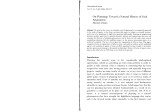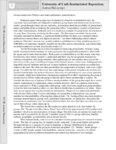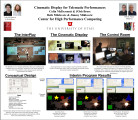TO
| Creator | Title | Description | Subject | Date | ||
|---|---|---|---|---|---|---|
| 201 |
 | Millgram, Elijah | Jonathan Lear, Love and it's place in nature and Open minded: working out the logic of the soul | It's not hard to imagine why Love and Its Place in Nature (now in a second edition, with a new preface by the author) has, in the decade or so it has been in print, received less attention from the philosophical community than it deserves. Its subtitle announces it as a "A Philosophical Interpretati... | Philosophy; Book Review | 2006-09-19 |
| 202 |
 | Nichols, Shaun | Do children think of the self as the soul? | Bering's work provides new insight into the child's concept of the self. For his results indicate that children don't regard bodily identity as required for identity of self across time. Bering's methodology for investigating afterlife beliefs might also be exploited to explore the extent to which c... | 2006-10 | |
| 203 |
 | Crowe, Benjamin D. | On the track of the fugitive Gods: Heidegger, Luther, Holderlin | At each of the decisive turning points in his philosophical career, Heidegger found inspiration in Holderlin. More recently, commentators have raised questions about the role that his reading of Holderlin played in Heidegger's political actions of the 1930s. It has been suggested that Heidegger's... | Philosophy;; Theology; Religion; Nationalism | 2007 |
| 204 |
 | Francis, Leslie | Ensuring the privacy and confidentiality of electronic health records | In 2004, President Bush announced his plan to ensure that most Americans would have electronic health records within ten years. Although substantial progress has been made toward achieving that goal, this progress has primarily reflected institutional interests and priorities by focusing on system ... | 2007 | |
| 205 |
 | Gehl, Robert W. | The politics of cultural programming in public spaces | In our digital media saturated lives, where we spend increasing amounts of time in "virtual worlds" such as Second Life or online on blogs and video sites, it can be easy to forget about public spaces. Unlike much content in virtual worlds, cultural programs in public spaces are events that are live... | 2007 | |
| 206 |
 | Millgram, Elijah | Who was Nietzsche's genealogist? | Nietzsche's Genealogy of Morals is deservedly part of the ethical canon, but it is also enormously and insistently absent-minded. I'm going to first present, as a textual puzzle, a handful of forgetful moments in the first two essays of the Genealogy. To address the puzzle, I will take up a familiar... | 2007-07 | |
| 207 |
 | Battin, Margaret P. | Legal physician-assisted dying in Oregon and the Netherlands: evidence concerning the impact on patients in "vulnerable" groups | If physician-assisted suicide (PAS) and/or voluntary active euthanasia were legalised, would this disproportionately affect people in ‘‘vulnerable'' groups? Although principles of patient autonomy and the right to avoid suffering and pain may offer support for these practices, concerns about the... | Vulnerable groups; Oregon; Netherlands | 2007-10-01 |
| 208 |
 | Crowe, Benjamin D. | Reasons for worship: a response to Bayne and Nagasawa | Worship is a topic that is rarely considered by philosophers of religion. In a recent paper, Tim Bayne and Yujin Nagasawa challenge this trend by offering an analysis of worship and by considering some difficulties attendant on the claim that worship is obligatory. I argue that their case for there... | Tim Bayne; Yujin Nagasawa; Obligatory worship; Divine command | 2007-12 |
| 209 |
 | Francis, Leslie | Knitting | My grandmother had long silver hair, high blood pressure, and congestive heart failure. She wore the silver hair in a bun during the day and in a braid at night. I remember her sitting in the day parlor of my grandparents? southern Illinois bungalow, telling the same stories of their small town, ove... | 2008 | |
| 210 |
 | Thalos, Mariam G. | Wit of knitting: a philosophical reflection on knitting things aright | Seeing a pattern in a medium of yarn emerge on a pair of needles, initially from a single row of loops, and grow to become an article of clothing, is immensely satisfying. Indeed, every moment of knitting provides immediate gratification. This is perhaps why knitting, like many other occupations of ... | 2008 | |
| 211 |
 | Thalos, Mariam G. | On planning: toward a natural history of goal attainment | The goal of the essay is to articulate some beginnings for an empirical approach to the study of agency, in the firm conviction that agency is subject to scientific scrutiny, and is not to be abandoned to high-brow aprioristic Philosophy;. Drawing on insights from decision analysis, game theory, gen... | 2008 | |
| 212 |
 | Battin, Margaret P. | C. G. Prado, choosing to die: elective death and multiculturalism | The central practical issue that this thorough, stimulating, and important book addresses is whether suicide can be rational in the context of terminal illness. Answers to this issue can be readily formulated in the familiar context of western political thought, with its liberal paradigm of autonomy... | 2008 | |
| 213 |
 | Thalos, Mariam G. | Molecule-for-molecule duplication | Is a molecule-for-molecule duplicate D of some entity always a perfect duplicate of it? And in particular: is D a being with consciousness if its original is? These questions summarize a certain diagnostic tool used by metaphysicians, and prominently used in service of a form of dualism that is supp... | Molecule-for-molecule duplication; MFM | 2008 |
| 214 |
 | Battin, Margaret P. | Terminal sedation: pulling the sheet over our eyes | Terminal sedation-also called "palliative sedation," "continuous deep sedation," or "primary deep continuous sedation"-has become a new favorite in end-of-life care, a seeming compromise in the debate over physician-assisted dying. Like all compromises, it offers something to each side of a dispu... | Terminal sedation; Palliative sedation | 2008 |
| 215 |
 | Francis, Leslie | No disability standpoint here!: law school faculties and the invisibility problem | Endeavors to increase diversity in higher education invite many questions, including concerns about consistent and categorical application of the motivating values. For example, do law schools, and especially elite law schools, do enough to promote inclusiveness in the legal profession if their eff... | Diversity; Higher education; Law school faculties; Invisibility problem | 2008 |
| 216 |
 | Andreou, Chrisoula | Addiction, procrastination, and failure points in decision-making systems | Redish et al. suggest that their failures-in-decision-making framework for understanding addiction can also contribute to improving our understanding of a variety of psychiatric disorders. In the spirit of reflecting on the significance and scope of their research, I briefly develop the idea that t... | Addiction; Failure in decision-making systems | 2008-08 |
| 217 |
 | Battin, Margaret P. | Review of euthanasia and law in Europe | Euthanasia and Law in Europe is an examination of physician-assisted dying or physician performed euthanasia and the laws concerning these practices in European jurisdictions where the issue has been most visible. The Author's focus primarily on the Netherlands, where the practice has been open si... | 2009 | |
| 218 |
 | Millgram, Elijah | Liberty, the higher pleasures, and Mill's missing science of ethnic jokes | The intended contribution to his moral theory of John Stuart Mill's famous distinction between higher and lower pleasures has occasioned long-standing puzzlement on the part of his more alert interpreters. I am going to explain how the distinction was meant, among other things, to allow Mill to demo... | Higher pleasures; Lower pleasures; Ethnic jokes | 2009 |
| 219 |
 | Gehl, Robert W. | YouTube as archive: who will curate this digital wunderkammer? | At first glance, the ease with which individuals can access and contribute to YouTube sets it in direct opposition to large corporate media outlets with their top-down mode of dissemination. However, in this paper, I argue that despite these seemingly democratic features, YouTube is better understoo... | 2009 | |
| 220 |
 | Thalos, Mariam G. | Systems | Dynamical-systems analysis is nowadays ubiquitous. From engineering (its point of origin and natural home) to physiology, and from psychology to ecology, it enjoys surprisingly wide application. Sometimes the analysis rings decisively false-as, for example, when adopted in certain treatments of hist... | 2009 | |
| 221 |
 | Nichols, Shaun | Confabulation, confidence, and introspection | Carruthers' arguments depend on a tenuous interpretation of cases from the confabulation literature. Specifically, Carruthers maintains that cases of confabulation are "subjectively indistinguishable" from cases of alleged introspection. However, in typical cases of confabulation, the self-attributi... | Confabulation; Carruthers | 2009-04 |
| 222 |
 | Crowe, Benjamin D. | F. H. Jacobi on faith, or what it takes to be an irrationalist | F. H. Jacobi (1743-1819), a key figure in the philosophical debates at the close of the eighteenth century in Germany, has long been regarded as an irrationalist for allegedly advocating a blind ‘leap of faith'. The central claim of this essay is that this venerable charge is misplaced. Following... | 2009-09 | |
| 223 |
 | Francis, Leslie | Group compromise: perfect cases make problematic generalizations | Rothstein argues that groups may be harmed by research on deidentified data. He concludes that researchers are obligated to minimize group harms and demonstrate respect for a studied group through robust opt-out capacities, information about the possibility of group-based harms, and publications ref... | 2010-01-01 | |
| 224 |
 | Miklavcic, Jimmy; McDermott, Colin Hull; Bross, Joshua Lee; Miklavcic, Elizabeth Ann | Cinematic display for telematic performances | The InterPlay is a live telematic performance that occurs simultaneously in multiple sites across the globe, streamed over the internet through the Access Grid videoconference system, then processed, mixed and projected before an audience. | Trapeze Interactive Poster | 2010-01-13 |
| 225 |
 | Goldberg, Robert A. | Kathryn S. Olmsted. Real enemies: conspiracy theories and American Democracy, World War I to 9/11 | In 1963, historian Richard Hofstadter donned the clinician's white coat to describe conspiracy theorists and a "paranoid style of American politics" given to exaggeration, distortion, and fantastical thinking. If still the favorite of journalists, Hofstadter's ideas have been significantly revised ... | 2010-04 |
